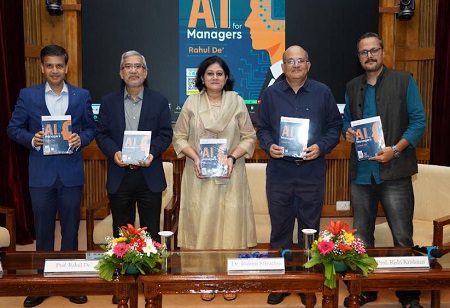CSITM Hosts Book Launch for Prof. Rahul De's Latest Work 'AI for Managers'
The Centre for Software and IT Management (CSITM) at IIMB hosted the book launch of former Information Systems area faculty Prof. Rahul De’s ‘AI for Managers’, as part of an AI bootcamp for Business Managers on 24 May 2025. The unveiling brought together Dr. Rohini Srivathsa, Chief Technology Officer, Microsoft India & South Asia; Prof. Rishikesha T. Krishnan, Director, IIMB; and Prof. Sourav Mukherji, Dean, Alumni Relations & Development. Prof. Shankhadeep Banerjee, Chairperson, CSITM, delivered the opening remarks.
Prof. Dé’s academic journey began in the AI lab at the Katz Graduate School of Business, University of Pittsburgh, where he studied under Nobel Laureate Herbert Simon. His work, since his days as a doctoral researcher, has focused on the application of AI in information systems and management. AI for Managers has brought this experience together in a volume designed to help business professionals navigate AI capability without deep backgrounds in mathematics or coding.
“What I set out to write,” Prof. Dé shared, “was a low-math, low-code book that explains AI in terms that managers can intuitively grasp. The goal is to empower readers to think critically about the technology and its implications for business and society”.
The book spans 16 chapters covering topics such as digital transformation, machine learning, responsible AI, natural language processing, deep learning, Bayesian learning, reinforcement learning, swarm intelligence, and agent-based modeling.
Rejecting both stances of unbridled optimism beating the AI drums and dystopian alarmism claiming breakdown of nation states, loss of jobs, mega control by corporations, and massive global poverty caused by the deluge of AI applications, Prof. Dé emphasized the importance of independent thinking. “We must understand the technology deeply enough to form our own judgments, not adopt ready-made positions”, he said.
Dr. Rohini Srivathsa shared perspectives on the shifting enterprise landscape: “With AI becoming mainstream, we are moving beyond use-case adoption to deeper transformation”. She outlined four emerging archetypes: shaper conversational employee engagement through generative AI, workplace and workflow transformation, operational efficiency, and innovation-led product development.
Prof. Sourav Mukherji, who moderated the panel, posed a question to Prof. RT Krishnan about the threat AI poses to knowledge building and delivery. “What we are now seeing is that AI, ML, and deep learning technologies have permeated business to the extent that when an MBA student goes to a job interview, there is an expectation of a fairly comprehensive understanding of AI capability. And the expectation might be higher depending on the industry”. He further added, “At IIMB, we were quick to realise that our curriculum needs to iteratively grow at an increasing pace so that our students are conversant with AI. The challenge for us now is to decipher to what extent we want AI to be part of the learning process itself”.
Commenting on organizational readiness, Dr. Srivathsa added, “We are still in the early days of enterprise AI adoption. But the frontier is expanding. AI will soon be seen not as a tool for optimization, but rather a general-purpose technology capable of reshaping core business processes”.
Workshop on fundamentals, best practices, and emerging trends in Artificial Intelligence
The AI bootcamp for Business Managers was led by Sunil Mishra, Founder, The Product Way, who drew from over 25 years of technology experience with organizations such as Infosys, Accenture, McKinsey & Company, and Oracle, to map the ways in which AI capability has created differentiation not only at an organizational level, but also in terms of everyday reasoning and decision-making.
The bootcamp brought together students from IIMB’s PGPEM programme for Working Professionals, PhD scholars, thinkers, developers, and professionals from diverse sectors, including aerospace, automotive, healthcare, fintech, banking, blockchain, and cybersecurity, representing Boeing, OLA, Adobe, IBM, OPTiM, and more.
Participants engaged with core AI developments, from early machine learning in the late 1990s, to deep learning as a form of predictive AI in 2006, the breakneck growth of generative AI in 2021, and the rapid emergence of agentic AI in 2025, which is poised to disrupt reasoning, automation and interoperability through autonomous decision-making.
The interactive session also raised critical questions around job redundancy in the face of accelerating AI adoption. The rapid proliferation of AI applications has brought us to a clear inflection point, the discussion pointed. “The disruptive impact is undeniable, but embracing AI tooling will only continue to serve as a source of competitive advantage, relevance, and agency”, said Sunil Mishra. Participants were encouraged to consider the nature of future work and to engage with this transformation as a necessary and constructive challenge.
Also Read: 5 Best Motivational Novels that have Garnered Substantial Appeal in India
Throughout the day, participants indulged in workshops, discussions and presentations on Introduction to classical AI stack, Neural networks and transformers, Evolution of LLMs, Architecture, training process, capabilities and limitations, Exploring zero-shot, one-shot and few shot-learning, Use of GenAI tools, Exercise for creating customer support bot, product prototypes and an online survey application, Finetuning LLM for specific use cases, Overview of RAG architecture and use cases, Overview of Agentic AI and use-cases, Use of Agentic AI platforms, Creating your own autonomous agent, Creating an HR policy agent, Create personal AI stock analyst, Emerging trends in Gen AI, and its Ethical, Regulatory, and Strategic considerations.
🍪 Do you like Cookies?
We use cookies to ensure you get the best experience on our website. Read more...






